
Henry William Thompson was an American country music singer-songwriter and musician whose career spanned seven decades.
"The Great Speckled Bird" is a hymn from the southern United States whose lyrics were written by the Reverend Guy Smith, and transcribed by singer Charlie Swain. It is an allegory referencing fundamentalist self-perception during the Fundamentalist–Modernist Controversy. The song is in the form of AA, with each section being eight bars in a two-beat meter, with these sixteen bars forming the musical background for each verse. It is based on Jeremiah 12:9, "Mine heritage is unto me as a speckled bird, the birds round about are against her; come ye, assemble all the beasts of the field, come to devour." It was recorded in 1936 by Roy Acuff. It was also later recorded by Johnny Cash and Kitty Wells, Pearly Brown (1961), Hank Locklin (1962), Marty Robbins (1966), Lucinda Williams (1978), Marion Williams, and Jerry Lee Lewis. George Jones & The Smoky Mountain Boys also recorded it in the early 1970s.

"Oklahoma Hills" is a song written by Woody Guthrie. In 2001 it was named the official Folk Song of the state of Oklahoma.
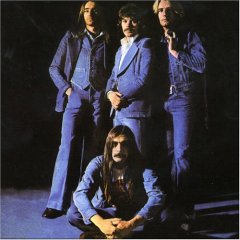
Blue for You is the ninth studio album by English rock band Status Quo. It was released in March 1976, and is the last album until 1980's Just Supposin' that the band produced themselves, which resulted in subsequent albums having a noticeably lighter, more pop oriented sound.

"Blue Eyes Crying in the Rain" is a song written by songwriter Fred Rose. First recorded by Elton Britt in 1946, then made more popular by Roy Acuff in 1947, the song has been covered by many artists, including Hank Williams Sr., Johnny Russell, Charley Pride, and Elvis Presley. Most notably, the song was recorded by Willie Nelson as part of his 1975 album Red Headed Stranger. Both the song and album revived Nelson's success as a singer and recording artist.
"I Don't Hurt Anymore" is a 1954 song by Hank Snow. It was written by Don Robertson and Jack Rollins.

Bright Lights and Country Music is a studio album by Bill Anderson and the Po' Boys. It was released in November 1965 on Decca Records and was produced by Owen Bradley. It was Anderson's first studio album to include dual credit with his band, The Po' Boys. It was his fourth studio album overall. The album included one single release, the title track. This song became a major hit on the Billboard country charts. The album itself also reached charting positions on Billboard shortly after its release.

"Cincinnati Lou" is a country music song recorded by Merle Travis and released on the Capitol label. It was co-written by Travis and Shug Fisher.
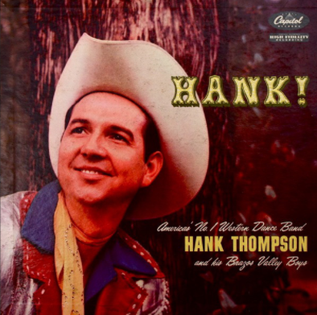
Hank! is a studio album by country music artist Hank Thompson and His Brazos Valley Boys. It was released in 1957 by Capitol Records.
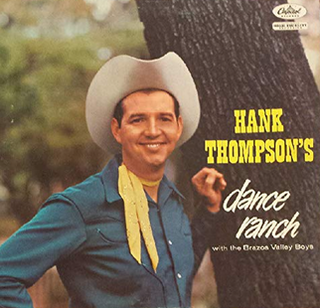
Dance Ranch is a studio album by country music artist Hank Thompson and His Brazos Valley Boys. It was released in 1958 by Capitol Records.

Favorite Waltzes is a studio album by country music artist Hank Thompson and His Brazos Valley Boys. It was released in 1959 by Capitol Records.
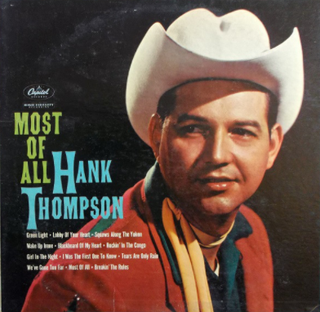
Most of All is a studio album by country music artist Hank Thompson and His Brazos Valley Boys. It was released in 1960 by Capitol Records. Ken Nelson was the producer.
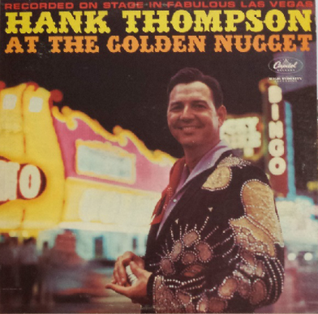
Hank Thompson at the Golden Nugget is a live album by country music artist Hank Thompson and His Brazos Valley Boys. It was released in October 1961 by Capitol Records. Ken Nelson was the producer.

Songs of the Brazos Valley is a studio album by country music artist Hank Thompson and his Brazos Valley Boys. It was released in 1956 by Capitol Records. It was Thompson's first album.

Golden Country Hits is an album by country music artist Hank Thompson and His Brazos Valley Boys. It was released in 1964 by Capitol Records. Ken Nelson was the producer.
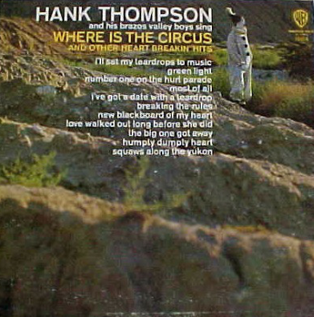
Where Is the Circus (And Other Heart Breakin' Hits) is an album by country music artist Hank Thompson and His Brazos Valley Boys. It was released in 1966 by Warner Bros. (catalog no. W1664). Joe Allison was the producer.

A Six Pack to Go is an album by country music artist Hank Thompson and His Brazos Valley Boys. It was released in 1966 by Capitol Records. Ken Nelson was the producer. The album consists of 12 songs related to drinking.
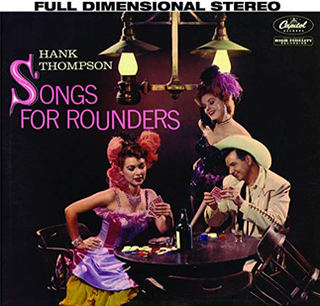
Songs for Rounders is an album by country music artist Hank Thompson and His Brazos Valley Boys. It was released in 1959 by Capitol Records. Ken Nelson was the producer. It was Thompson's first stereo album.

On Tap, in the Can, or in the Bottle is an album by country music artist Hank Thompson and the Brazos Valley Boys. It was released in 1968 by Dot Records. Joe Allison was the producer.
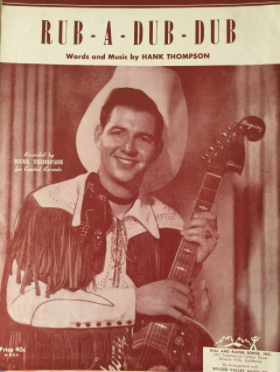
"Rub-A-Dub-Dub" is a country music song written by Hank Thompson, performed by Thompson and his Brazos Valley Boys and released on the Capitol label. It is based on the 18th century nursery rhyme, "Rub-a-dub-dub". It was Thompson's second hit record based on a nursery rhyme, following his 1948 recording of "Humpty Dumpty Heart".


















